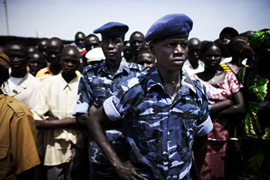Sudan candidate sings another tune
Mary Boyoi never dreamt of running in Sudan’s election, until she found herself in it.

While the subject of politics dominates much of Mary Boyoi’s music, the southern Sudanese singer never dreamt of running for election.
In January, this well-known entertainer was thrust into party politics when she received a nomination to run for parliament in Sudan’s upcoming elections on April 11.
The elections are to be the first of their kind since 1986 in this embattled country. While Boyoi is honoured to represent her community, she fears that Sudan’s volatile political environment might be more than she may be ready for.
“Every minute, every hour, I am changing like a chameleon, like I don’t want it [the nomination] any more,” the 28-year-old says after a meeting with supporters in the southern capital of Juba.
Boyoi has never been shy about addressing political issues in her music. Her debut album, released in 2007, is entitled Referendum, referring to an independence referendum scheduled to take place in southern Sudan in 2011.
Many of the songs on the album are political in nature. In 2009, Mary released a single called Election Jai, meaning the elections are coming.
“A historic day is coming,” Boyoi sings.
“Don’t vote for your relative or tribesman, vote for those who will lead us equally.”
Difficult politics
The elections are set to occur just five years after southern Sudan emerged from a brutal civil war between the north and south. The war, which ended in 2005, left more than two million people dead and caused around four million people to flee their homes.
While the 22-year war was ostensibly fought between the north and south, there remains considerable disagreement and, in some cases, hostility between various southern factions that now manoeuvre for political control in the South.
“I cannot explain the politics of southern Sudan because it’s so difficult,” Mary says. “The government of south Sudan is SPLM. Even our flag is SPLM.”
The SPLM, or Sudan People’s Liberation Movement, is the political wing of the Sudan People’s Liberation Army, the rebel group that battled the Sudan Armed Forces during the war.
The agreement that ended the war, known as the Comprehensive Peace Agreement, gave the SPLM overwhelming command of the interim southern government, known as the Government of South Sudan.
 |
| The elections come five years after southern Sudan emerged from civil war [Pete Muller] |
Emerging voices
The upcoming elections, which are mandated by the peace agreement, provide an opportunity for new and emerging political voices in the south.
But Boyoi fears that political pluralism could cause conflict. “You have to be ready for anything,” she says.
“It is more scary in Sudan because we are transforming the soldiers into civilians and … people have this mentality of killing, killing,” she adds.
She enters the political fray with both conviction and reservation, but is no stranger to the violent nature of Sudan’s political world. In 1989, her father, a chief among her tribe, the Murle, and a military commander with the SPLA, was killed during the civil war.
Nearly two decades later, in 2006, her brother was killed during minor political wrangling in Juba. The singer fears that venturing into politics could bring the same fate upon her.
“I’m scared. Like someone will try to kill me,” she laments. “I think everyone in elections has to be so fierce. I attended the elections in Kenya two years ago and it was very dangerous. And Kenyans are very far ahead of us. If Kenya is like that, what about Sudan? We just got the Comprehensive Peace Agreement the other day.”
‘Transforming society’
Despite her concerns, she pushes on. She has accepted the nomination to run for southern Sudan’s national-level parliament on behalf of the Southern Sudan Democratic Forum (SSDF), a party outside of the dominant SPLM.
SSDF was formed in London in 2001 by exiled Sudanese. Dr Martin Elia Lomoro, the party chairman, believes that Boyoi can be of great benefit to the SSDF.
“I see her as a huge resource to the party because delivery of messages in musical form is the easiest way of transforming society, of making society absorb those political messages,” Lomoro explains inside his corner office.
He also believes that Boyoi will need to brace herself for the harsh reality of southern Sudan’s political world. “If you think you are receiving telephone calls already, if you think you’re feeling insecure, you better prepare for even more of that,” he remarks.
Boyoi’s mother, Angelina Liila, wishes that her daughter would stick to music and avoid dabbling in the politics that cost her a husband and son. “The politics here are so dangerous and we’ve already lost a lot. I wish she would just continue with music. She has been successful,” she says.
Despite her concerns, Boyoi believes that her experiences can help inspire others. “Okay, I lost a lot in this war,” she explains. “I lost my father and brother, and I was a refugee.”
“I should be an example to other people to not give up.”
Pete Muller is a photographer and multimedia reporter based in Juba, Sudan.